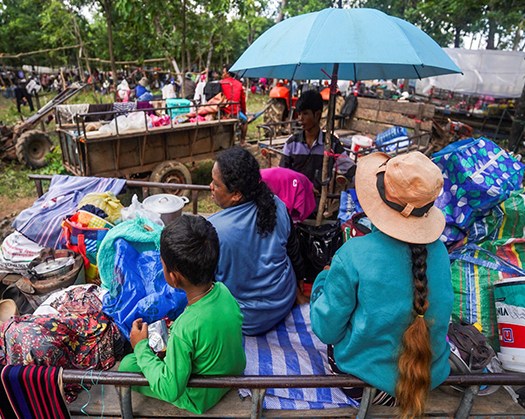Muscat: The future of childhood is precariously balanced, teetering on the edge of significant change, unless immediate measures are undertaken to protect the rights of children in an evolving global landscape, UNICEF has cautioned in its seminal report, released on the occasion of World Children’s Day on Wednesday.
The report, titled ‘The State of the World’s Children 2024: The Future of Childhood in a Changing World’, delves into the impact of three pivotal global forces, or megatrends, on the lives of children by 2050 and beyond. These megatrends – demographic change, climate and environmental crises, and breakthrough technologies – serve as critical indicators of the challenges and opportunities that children may encounter in the future.
“Children are navigating through a multitude of crises, ranging from climate-induced shocks to the perils of the digital world, and these challenges are poised to intensify in the coming years,” stated UNICEF Executive Director Catherine Russell. “The findings in this report highlight that the decisions made by world leaders today – or the lack thereof – will shape the world that children will inherit. Achieving a brighter future for 2050 demands more than mere imagination; it necessitates concrete action. The decades of progress, especially for girls, are at risk of being undone.”
The climate crisis is already in a critical state, with 2023 marking the hottest year on record. According to the report, the decade spanning 2050-2059 is expected to witness an escalation in climate and environmental crises, with children projected to face eight times the exposure to extreme heatwaves, three times the exposure to extreme river floods, and nearly double the exposure to extreme wildfires, compared to the 2000s.
The impact of these climate hazards on children will vary based on their age, health status, socioeconomic background, and access to essential resources. For instance, a child equipped with access to climate-resilient housing, cooling infrastructure, healthcare, education, and clean water stands a better chance of withstanding climatic disturbances compared to a child lacking these resources. The report underscores the pressing need for targeted environmental measures to safeguard the well-being of all children and to mitigate the risks they face.
Sub-Saharan Africa and South Asia are projected to host the largest populations of children in the 2050s. These projections also reveal an aging global population, with the proportion of children expected to decline across all regions of the world.
While the global child population remains significant, it is projected to decrease below 40 percent in Africa – a drop from 50 percent in the 2000s. It is anticipated to fall below 17 percent in East Asia and Western Europe, where children constituted 29 percent and 20 percent of the populations, respectively, in the 2000s.
These demographic shifts pose challenges, with some countries facing the need to expand services for large child populations, while others must balance the demands of an expanding elderly demographic.
In the meantime, the report acknowledges the dual nature of frontier technologies, such as Artificial Intelligence (AI), which present both potential benefits and risks for children. These technologies are already integrated into various mediums, including apps, toys, virtual assistants, games, and educational software, through which children engage. However, the digital divide continues to be a significant issue. By 2024, it is projected that over 95 percent of individuals in high-income nations will have internet access, in stark contrast to just under 26 percent in low-income countries.
The report highlights that a considerable portion of youth in low-to-middle-income nations face challenges in accessing digital skills, which will undoubtedly affect their capacity to utilize digital tools effectively and responsibly in educational settings and future employment environments. These challenges are often intertwined with socio-economic conditions, gender, language barriers, and accessibility issues.
Despite these challenges, the report also contains positive findings. It projects an increase in life expectancy at birth and anticipates that access to education for children will continue to expand over the next century. It is expected that by the 2050s, nearly 96 percent of children worldwide will have at least a primary education, a significant increase from the 80 percent achieved in the 2000s.
Furthermore, with increased investment in education and public health, alongside stricter environmental regulations, the report suggests that outcomes for children could see substantial improvements. This includes narrowing the gender gap in educational attainment and reducing exposure to environmental hazards.
The State of the World’s Children 2024 underscores the critical need to prioritize child rights, as outlined in the United Nations Convention on the Rights of the Child, in all strategies, policies, and actions. It advocates for addressing the challenges and opportunities presented by the three megatrends by investing in education, services, and sustainable and resilient urban environments for children.
This year, World Children’s Day, UNICEF’s annual observance for children, is being celebrated with the theme, “Listen to the Future.” As part of this initiative, UNICEF has invited children to submit letters envisioning the world they aspire to see in 2050. The response has been overwhelming, with letters received from various locations, including Gaza City, Haiti, and Tanzania, all expressing the children’s desires for safety, health, and education, as well as protection from conflict and environmental threats. These letters are available for viewing here.
"World Children’s Day serves as a pivotal moment for leaders to demonstrate their commitment to the rights and well-being of every child," stated Russell. "We have the power to shape a brighter future for the children of tomorrow, and it is imperative that we begin this journey today."












